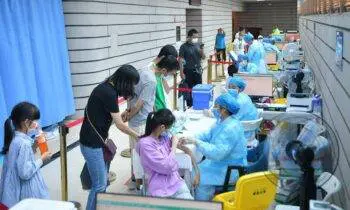
Yunnan Province, a well-known travel destination in China, has begun to offer booster shots of COVID-19 vaccines to key groups, with tourism workers being the primary target.
The measure comes as China accelerates booster shots for key groups in order to further consolidate the nation’s epidemic prevention and control achievements and improve the protective efficacy for people at high risk of infection in a timely manner.
Workers at customs and border inspection offices or in the aviation industry, as well as employees of quarantine centers and designated medical institutions, are among those at high risk of infection.
Currently, at least 12 provinces and regions in China have begun to provide booster shots for key groups.
The health authority in Lijiang, a beautiful scenic spot, announced on Monday that the city will provide a booster shot for adults who have been fully vaccinated for at least 6 months. Aside from the key groups mentioned above, the city also rolled out vaccinations for special groups based on local conditions. Those who work in tourism and are over the age of 60 are classified as special groups.
In addition, the authorities in Honghe Hani and Yi Autonomous Prefecture announced on Monday that they are ready to provide booster shots to people over the age of 18 who have been fully vaccinated for at least 6 months.
The prefecture emphasized that the campaign includes the residents of three border counties and cities, as well as those over the age of 60. The prefecture provides inactivated and CanSino vaccines.
Authorities in Lincang and Ruili, two border regions in Yunnan, also announced a similar policy.
Yunnan has been struggling to combat imported cases due to the province’s 25 border cities and counties.
On July 20, China reported the highest daily tally of new confirmed COVID-19 cases since January, owing to an increase in imported infections in Yunnan, where cases are spreading from an alarming spike in neighboring Myanmar.
Ruili, a city bordering Myanmar, drew public attention again in August as its fourth wave of domestic outbreaks shows no signs of abating after one domestic COVID-19 case was reported, highlighting the complexities of border epidemic prevention and control.
Due to a volatile political situation and worsening coronavirus infections, over 10,000 Chinese nationals were waiting to return to China at Ruili on October 2, putting significant strain on the border city.



